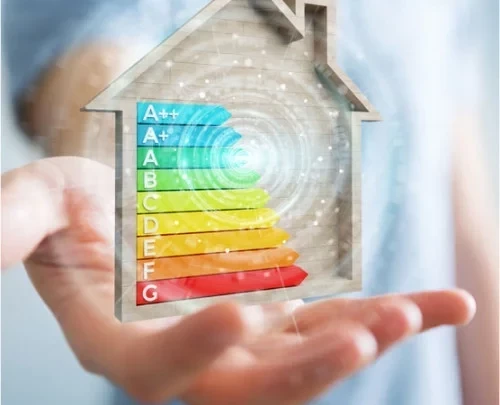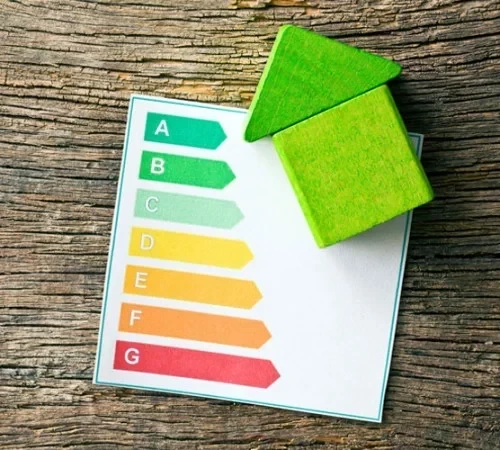The world of energy performance certificates and electrical installation condition reports is a complex one. There’s lots of legislation, lots of different reports and, if you don’t have any experience in this area, it can all be a little bit overwhelming!
Put simply, an energy performance certificate, also known as an EPC for short, certifies how energy efficient a property or building is. Buildings are given a rating from A-G, with A being the most efficient. You may recognise the iconic colour code scale – you’ll see it on property websites, and you’ll see something similar on your new washing machine.
But, as you’ll soon learn, this is just the start. There are so many questions left unanswered when it comes to EPCs. What’s an EPC rating? What’s an EPC register? Are they required for commercial buildings, temporary buildings, and how about a residential agricultural building?!
As a landlord, property owner or just generally the responsible person for a commercial building, if you don’t know the answers to these questions, you probably should. There are certain legal requirements around commercial EPCs and failure to comply can land you with some hefty fines!
So, what is a commercial energy performance certificate and what does it all mean for you? We’ve been issuing these certificates for over 10 years now and are passionate about what we do. So passionate that we have pulled together all of the most important information about commercial EPCs that will, hopefully, help answer all the above questions and more.
So, we’ve already briefly outlined what a commercial energy performance certificate is. It’s a certificate that rates how energy efficient a property is with a rating system of A-G, with A being the most efficient.
These ratings come from information gathered on the energy efficiency levels and carbon emissions present in a building. To provide a grade, these levels are checked against comparative buildings.
Generally, with each EPC comes a recommendation report, which specifies how improvements can be made to improve the energy rating. The certificates also tell you how expensive it is likely to be to light and heat a property, and they’ll predict what your carbon monoxide emissions will be.

You need a commercial EPC if you are renting out or selling your property. You also need an EPC for a ‘new build’ that has just been finished. This is called an ‘on construction’ certificate and should be arranged by the person completing the work, if they are to comply with building regulations.
Where you are buying or selling your property, you must provide the EPC to the prospective buyer or tenant no later than the viewing. This should be included in the paperwork pack you provide. Should you fail to do this, you could be subject to a hefty fine.
The fine is calculated as being 12.5 percent of the property value - the minimum fine is £500 and the maximum is £5000. You will then be required to purchase the EPC afterwards. All in all, the cost of not having an energy performance certificate can be quite big.
Government regulations also state that you must display an EPC, by fixing it to your building, if it is frequently visited by the public and/or has a total useful floor area of over 500m2.
You will also be required to provide an EPC if you make significant changes to buildings that are classed as ‘sub-divided’ – i.e. a building that has been divided into several separate flats. An example of where you would need a new EPC is if you install a new, separate heating system for one part of the building that is to be used for accommodation. Other examples are changes to air conditioning or mechanical ventilation systems.

There are certain situations in which you won’t need an EPC:
A residential agricultural building that is up for sale or let would require an energy performance certificate.
So, how is an EPC inspection carried out?
These checks cannot be done remotely – they have to be done in person. Our highly trained assessor will come out to your building and inspect all rooms of the property. The assessments are designed to be non-intrusive, but they may require information about things such as insulation and will look at heating systems, air conditioning units, etc.
The assessor will take photos of the building and measure the rooms to establish the total useful floor area. Where they can’t evidence certain things, they will make assumptions based on the age and construction of the property. This is done on site using specialist software.
To book your inspection, contact us on the details below or give us a call on 0203 397 8220. You’ll need to provide us with contact, property and payment details, and we’ll send you a confirmation email with a receipt. The following day, your dedicated assessor will contact you to make an appointment, with the aim being to visit your property within three days of the call.
Once your inspection is complete, the assessor will have the EPC with you the following working day. This will come to you via email.

We can offer commercial EPC inspection and certifications for as little as £95, but the price will depend on factors such as the age and size of the building. You can get an instant quote by filling out the form on our website (details below).
This depends on whether you are selling or letting the property.
An EPC will give your building a rating of between A and G. When you are selling the property, you cannot get a fail, and you can sell the building regardless of the rating (providing the buyer is happy, of course).
However, it is a legal requirement when letting out a property for the building to have at least an E rating. This legislation came in in 2018 and applies unless you have a suitable exemption.
Commercial energy performance certificates are valid for ten years, or until a newer version is produced.
Where you have had an EPC with areas of improvement identified, and you have made said improvements, it may be in your interest to get a new one before ten years is up – in order to showcase and display your building in the best light.
You may also be required to get a new EPC if you make changes to your building – such as those outlined in the previous section about sub-divided properties.

We have been in this business for over 10 years and are proud to offer affordable, high-quality EPC inspections and certificates. Our team is highly professional and qualified. Importantly, they are extremely personable and friendly, and committed to giving you the best possible service.
Here are three reasons why we think you should choose us for your EPC needs:
We are a leading provider of energy performance certificates in the UK and specialise in a range of areas, giving us a wide range of experience that ultimately benefits our customers. Get in touch with us today to learn more.
You can get an instant quote at https://energyperformancecertificates.co.uk/order-service, give us a call on 0203 397 8220 for more information, or email us at hello@energyperformancecertificates.co.uk.